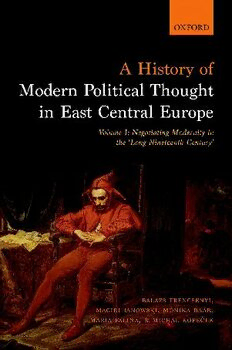Table Of ContentA HISTORY OF MODERN POLITICAL THOUGHT
IN EAST CENTRAL EUROPE
A History of Modern
Political Thought in East
Central Europe
‘
Volume I: Negotiating Modernity in the Long
’
Nineteenth Century
BALÁZS TRENCSÉNYI, MACIEJ JANOWSKI,
MÓNIKA BAÁR, MARIA FALINA, AND
Č
MICHAL KOPE EK
1
3
GreatClarendonStreet,Oxford,OX26DP,
UnitedKingdom
OxfordUniversityPressisadepartmentoftheUniversityofOxford.
ItfurtherstheUniversity’sobjectiveofexcellenceinresearch,scholarship,
andeducationbypublishingworldwide.Oxfordisaregisteredtrademarkof
OxfordUniversityPressintheUKandincertainothercountries
©BalázsTrencsényi,MaciejJanowski,MónikaBaár,MariaFalina,
andMichalKopeček2016
Themoralrightsoftheauthorshavebeenasserted
FirstEditionpublishedin2016
Impression:1
Allrightsreserved.Nopartofthispublicationmaybereproduced,storedin
aretrievalsystem,ortransmitted,inanyformorbyanymeans,withoutthe
priorpermissioninwritingofOxfordUniversityPress,orasexpresslypermitted
bylaw,bylicenceorundertermsagreedwiththeappropriatereprographics
rightsorganization.Enquiriesconcerningreproductionoutsidethescopeofthe
aboveshouldbesenttotheRightsDepartment,OxfordUniversityPress,atthe
addressabove
Youmustnotcirculatethisworkinanyotherform
andyoumustimposethissameconditiononanyacquirer
PublishedintheUnitedStatesofAmericabyOxfordUniversityPress
198MadisonAvenue,NewYork,NY10016,UnitedStatesofAmerica
BritishLibraryCataloguinginPublicationData
Dataavailable
LibraryofCongressControlNumber:2015949942
ISBN 978–0–19–873714–8
PrintedinGreatBritainby
ClaysLtd,StIvesplc
LinkstothirdpartywebsitesareprovidedbyOxfordingoodfaithand
forinformationonly.Oxforddisclaimsanyresponsibilityforthematerials
containedinanythirdpartywebsitereferencedinthiswork.
Contents
Introduction 1
PART I. THE DISCOVERY OF MODERNITY:
ENLIGHTENED STATECRAFT, DISCOURSES OF
REFORM, AND CIVILIZATIONAL NARRATIVES 15
1. ThePoliticsofImprovement:EuropeanModelsandLocal
Traditions 25
1.1 Forginganew“reasonofstate” 25
1.2 Legitimizingandreformingtheestatesystem 43
1.3 Patrioticallegianceandnationalmobilization 56
2. NationalProjectsandCivilizationalHierarchies 67
2.1 Expansionofthe“publicsphere” 67
2.2 Polishingthelanguage:Theemergenceofvernacularism
anditspoliticalsubtext 78
2.3 Ancientgloryandstadialdevelopment:Enlightenment
narrativesofthepast 91
2.4 Therisinginterestinarchaismandtheproblemof
the“internalother” 105
3. TheRepercussionsoftheFrenchRevolutionandthe
NapoleonicWars 116
3.1 Fascinationandabhorrence 116
3.2 The“HistoricalSublime”knockingatthebackdoor:
NapoleonandEastCentralEurope 126
3.3 After1815:LegitimismandtheharbingersofRomantic
Nationalism 132
PART II. SPIRITUALIZING MODERNITY:
THE ROMANTIC FRAMEWORK OF
POLITICAL IDEAS 137
4. “PlayingthePianothatdoesnotyethaveStrings”?The
Cultural-PoliticalProgramsofthe“NationalRevivals” 143
4.1 ThelonglifeofEnlightenmentideas 143
4.2 Thequestforemancipation 152
vi Contents
4.3 “Notdead,butsleepeth”:Discoursesofnationalawakening 168
4.4 Ruinsandresurrections:Thesearchforsuitableancestors 181
4.5 Betweennationalandsupranationalloyalties 191
4.6 From“Missionism”toMessianism 203
5. PoliticalVisionsoftheVormärz 214
5.1 Theemergenceoftheliberalnationalistproject 214
5.2 Moderatesandradicalsinthereformmovement 220
5.3 Critiquesofnationalawakening 228
6. BrotherhoodandDisappointment:1848anditsAftermath 236
6.1 Visionsofrevolutionarytransformation 236
6.2 The“socialissue”duringtherevolutions 246
6.3 Theclashofnationalaspirations 254
6.4 IdeologistsoftheCounter-Revolution:ForwardtothePast? 265
6.5 TheaftermathoftheRevolution:Self-criticismand
anti-absolutism 269
PART III. INSTITUTIONALIZING MODERNITY:
CONCEPTIONS OF STATE-BUILDING AND
NATION-BUILDING IN THE SECOND HALF
OF THE NINETEENTH CENTURY 277
7. TheInterplayofNationalandImperialPrinciples
ofOrganization 281
7.1 Solvingtheriddleofthe“EasternQuestion” 281
7.2 “Withyou,OurMostGraciousMonarch,westayandwish
tostay”:IdeologiesofCompromise,Dualism,andTrialism 291
7.3 Theriseofpan-nationalideologies 309
8. ThePoliticalImplicationsofPositivism 318
8.1 The“criticalturns”:ChallengingtheRomanticconstructions 318
8.2 Positivisthistoricalnarratives 328
8.3 Studyingthenation 339
8.4 Overcomingbackwardness:Thediscoursesof
“nationaleconomy” 346
9. TheRiseandFallof“NationalLiberalism”after1848 356
9.1 Theparadigmshiftoftheliberaldoctrine 356
9.2 Liberalismandthe“ChurchQuestion” 368
9.3 Theanti-liberalleft 376
9.4 Themergerofethnicismandconservatism:
Theemergenceofpoliticalanti-Semitism 382
Contents vii
PART IV. TAMING MODERNITY: THE FIN DE
SIÈCLE AND THE RISE OF MASS POLITICS 391
10. Liberals,Conservatives,andMassPolitics 395
10.1 Responsesto“politicsinanewkey” 395
10.2 Thelimitsofliberalism 401
10.3 Thenewconservatives:Attemptsatmobilization 408
10.4 Fin-de-sièclereligionandpolitics:Between
modernismandneo-traditionalism 414
10.5 Theriseofintegralnationalism 425
11. TheLeftandtheAmbiguityoftheMarxistPackage 431
11.1 Civicradicalism:Intellectualsinsearchofanewidentity 431
11.2 Socialismandunderdevelopment 446
11.3 Agrarianpopulism:AnEastCentralEuropean
localtradition? 469
11.4 Anarchistsandanarcho-syndicalists:Contesting
evolutionarysocialism 484
12. CopingwithDiversity 495
12.1 Multiethnicityasapoliticalissue 495
12.2 Federalismasasolutiontothenationalityquestion 512
12.3 Supranationaltheoriesandtransnationalmovements 529
12.4 The“JewishQuestion”:Theentanglementof
assimilation,anti-Semitism,andZionism 544
13. TheFacesofModernity 564
13.1 Themodernizationofhistoriographyandthe
sociologicalgaze 564
13.2 Individualism,decadence,andcollectiveregeneration 581
13.3 The“Women’sQuestion”andfeminism 593
14. TheGreatWar 609
14.1 Waraimsandvisionsofthefuture 609
14.2 Projectsofregionalreorganization 624
14.3 Nationalmobilizationandsocialdisintegration 631
SelectBibliography 641
Index 675
Introduction
The principal aim of this work is to provide an overview of the history of
modern political thought in East Central Europe. Being equally open to
supranational and subnational (regional) frameworks of interaction, it offers
agenuinelytransnational intellectualhistory. Itisnota compendiumof case
studies, nor does it follow the type of deductive area-studies approach that
tendstoeliminatedifferencesintheinterestsofforgingageneralizedmodel.It
is a synthetic narrative—the result of the efforts of a multinational team
workingtogetherforalmostadecade.
Since 1989 there has been an increasing demand for a more context-
sensitive rethinking of European political thought. However, such a project
cannot be based merely on the projection of Western European historical
narratives onto the whole continent, but requires careful scrutiny of specific
regional and local ways of dealing with modernity. In particular, recent
debates in comparative European politics have focused on the role of indi-
genous political cultures in developing and sustaining democracy. All this
points to the need for well-informed, methodologically advanced empirical
studies to help create a more complex framework for comparing and linking
politicaltraditions.Byshiftingthereferencepointofhistoricalthinkingfrom
the“West”tothecross-EuropeanexperiencewithaspecialemphasisonEast
Central Europe, these two volumes aim to contribute to a rethinking of the
“negotiation of political modernity,” facilitating the move from “methodolo-
gical nationalism” and oversimplification towards a more encompassing no-
tionofwhatconstitutestheEuropeanintellectualheritage.
Consequently, our aim is twofold: to globalize the history of East Central
European political thought, while at the same time to “renegotiate” the
European intellectual canon. In order to accomplish this, however, we must
gobeyondthetaskofexpandingthepoolof“shared”references.Weneedto
rethinktheverycategoriesinwhichthehistoryofmodernpoliticalideas—and
thus of political modernity, as such—has traditionally been formulated.
By analyzing the contested models of modernity these cultures developed
over the nineteenth and twentieth centuries, from the Enlightenment up to
thepost-Communistperiod,wehopetocontributetotheformationofanew

